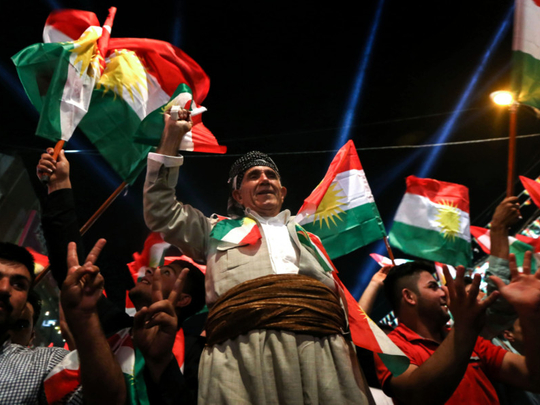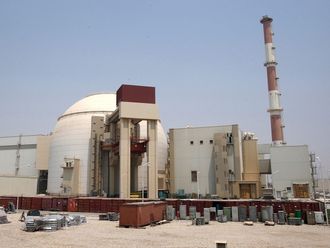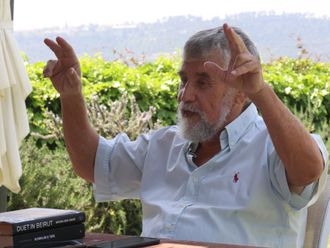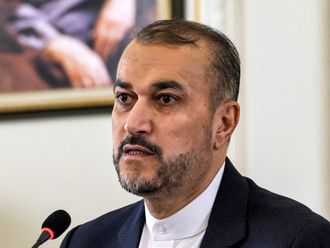
London: As Iraqi Kurds move to cast their votes in the forthcoming referendum, scheduled for September 25, for the first time many have hope for stability and prosperity.
Since the call for the referendum in June by the President of Kurdistan Regional Government (KRG), Masoud Barzani, the Kurds of North Iraq have been by and large celebrating non-stop as if independence had already been declared.
“We dislike being referred to as Kurds of North Iraq,” a close Iraqi Kurdish family friend, who has been in exile in London since 1990s, told me last week.
“This is very offensive,” she said, adding: “It is time we are referred to as Kurds from Southern Kurdistan as we truly are, not from North Iraq.”
She was reminding me of their hoped-for future country of Kurdistan that historically encompasses a huge chunk of South-East Turkey, with approximately 16 million Kurds; parts of North-West Iran, with almost 8 million; scattered areas in North Syria, with 2.5 million; as well the Kurds in Iraq that number more than 8 million people.
If one adds the estimated two million Kurds outside their historic territories, this brings the total number of the Kurdish population to more than 35 million.
With a unique culture and carefully maintained traditions, this qualifies the Kurds as a nation, but they are still without a state.
However, independence is not expected to be declared immediately after the referendum, even though the result is practically a forgone conclusion.
KRG has been very careful to repeatedly indicate that the referendum is only a first step towards nationhood.
“One day the Kurds will undoubtedly have their own state that they call home,” a leading Kurdish veteran writer, Kamran Al Karadaghi, told Gulf News.
“Though the road to final independence has become shorter, but in no way is [it] less arduous”.
Hundreds of thousands of Kurds have lost their lives over the second half of the past century at the hands of the former dictator of Iraq, Saddam Hussain, Al Karadaghi said.
“Enough is enough, and it is time the world should help us cross the hurdles ahead. Enough of Halabja and Anfal tragic massacres”, he added. Al Karadaghi was referring to what many considered at the time Hussain’s “final solution” to the ‘Kurds problem’ in Iraq; he decided in 1988 to use chemical weapons against the two Kurdish cities, which killed between 150,000-250,000 Kurds — most of whom were civilians.
When the defeated Iraqi army returned to bases in Iraq, they had to face two major uprisings: the Kurds in the North and the impoverished Shiite majority in the South.
The Kurds managed to reach an agreement with Baghdad’s central government with the support of international intervention, to establish a safe-haven and no-fly zones in the North along Turkish borders.
A protracted negotiation with Hussain’s government eventually reached a dead end in February 1992, which led to the Kurds administering their own affairs.
They organised their own election and so established their first parliament.
The newly-elected parliament voted for a federal system and promised the Kurdish province would be an integral part of Iraq.
The Kurds have remained relatively loyal to Baghdad since then, and have largely been able to steer clear of Iraq’s sectarian violence — especially following the toppling of Hussain in 2003 by the US, which led to an Iranian-backed government stepping in to fill the power vacuum.
Since then, they have been slowly building stable and functional state institutions, and have proven themselves trustworthy a partner to the Americans — especially in the fight against Daesh in Iraq and Syria.
The Kurdish leadership “is so far wisely moving”, Al Karadaghi said, “with no error of judgement and we have to wait and see how people will react to the results”.
However, global acceptance of a vote for independence is not guaranteed and powerful states in the region such as Turkey and Iran have vehemently rejected attempts at Kurdish independence.
Last month, Turkish president Recep Tayyip Erdogan suggested that Turkey and Iran could team up to attack the Kurdish groups that both countries consider as ‘terrorists’, marking a significant escalation in rhetoric.
The success of the Kurdish state, however, will be largely dependent on whether or not the US will step in to protect the Kurds if such threats are actually carried out by Turkey or Iran.












